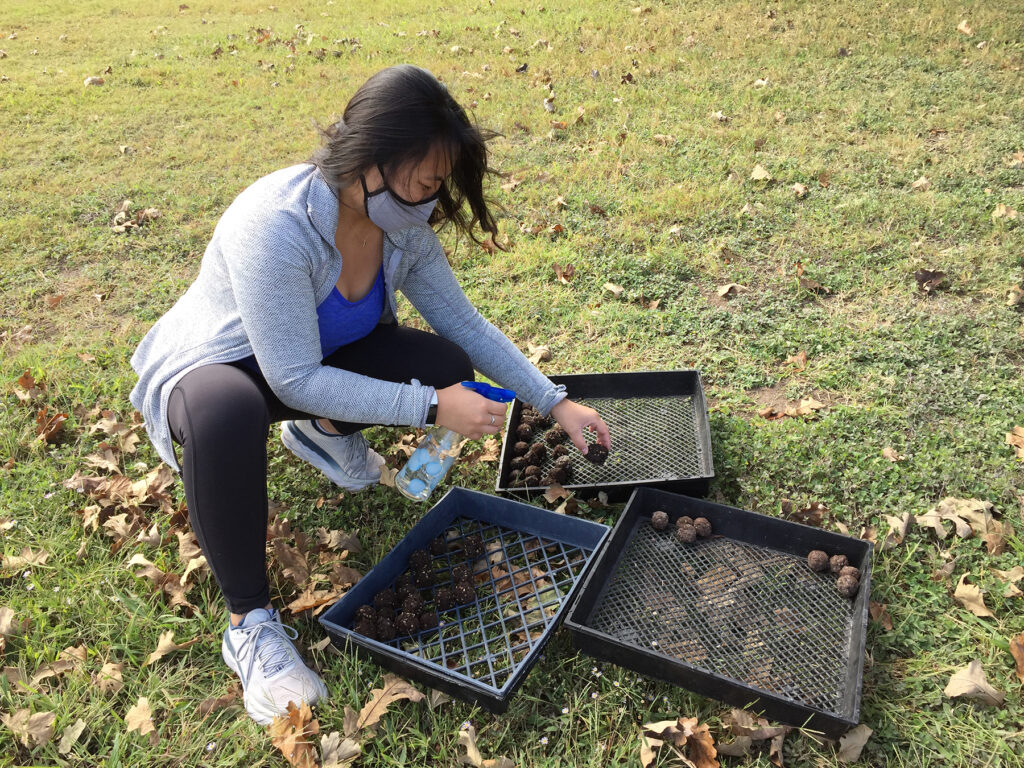When you hear the word “sustainability,” you might automatically think of environmental activism like recycling and switching to renewable energy. But, as Veronica Johnson, Southwestern University’s sustainability coordinator says, it’s about so much more than just saving the environment. It also means addressing the social foundation by making sure everyone has access to basic needs; food, water, healthcare, and education, while not overstepping our planetary boundaries. “It’s about how we as a society can do more good, instead of doing less bad,” she says, adding that we need to meet the needs of the present without compromising future generations’ ability to meet their needs. “We’re on a finite planet and if we continue business as usual without taking a step back and looking at the whole system, we’re going to run into problems.”
That has been SU’s goal for many years already, a mission maintained by students’ strong environmental interest. But at times, projects would halt after their leaders graduated, leading to unsustainable sustainability initiatives. That’s where Veronica came in.

A GROWING PROGRAM
In 2015, the Environmental Studies Capstone class and Environmental Studies Department chair Dr. Joshua Long proposed establishing the Office of Sustainability, which was created last year with Veronica at the helm. Since then, ten part-time student workers have come on board as EcoReps who lead the following initiatives:
- Food: Work with SU’s dining provider to promote and increase the sustainable food offerings and donations, research the feasibility of establishing an on-campus farmers market, create an on-campus food pantry.
- Energy: Research energy management systems, assess and evaluate individual energy conservation actions, research ways to make the campus fleet greener.
- Grounds: Create a 50-year tree planting plan, complete requirements for SU’s Tree Campus Higher Education and Bee Campus USA recognitions.
- Waste: Revive the campus compost program, re-purpose food waste into animal feed, encourage reusable over single-use items.
Additionally, two part-time student interns serve as Sustainability Stewards, who help collect campus sustainability data for SU’s upcoming Sustainability Tracking, Assessment & Rating System (STARS) report, and tell the story of the campus’ sustainability initiatives.
Building a culture of sustainability at SU is Veronica’s goal. She is supporting student-led sustainability projects (EcoRep program), opened the Treasure Chest campus exchange store, which promotes thrifting and sustainable fashion; hosting Campus Sustainability Month events, retrofitting two residential halls with eco-friendly furniture, and pushing for a sustainable business class and well-being workshops. She also launched the Georgetown Green Film Series, which features films with an environmental focus. The Sustainability Office is also piloting feminine product accessibility and recently partnered with OrganiCup to distribute free menstrual cups to more than 150 students.
Continuing sustainability programming hasn’t been easy during a pandemic, especially since many exciting in-person events like the fashion show and composting competition during Earth Month (April) had to be canceled. “It was really hard to figure out virtual ways of maintaining engagement,” Veronica says. But she and EcoReps got creative, expanded their social media outreach, and launched the Sustainability Webinar Series, starting with a bat appreciation webinar that replaced a bat house reveal ceremony.
She also hopes to re-open the Treasure Chest store very soon and will post updates on their website and social media.
SUSTAINABILITY AT HOME
Wondering how you can help the planet? Veronica shares some ways you can reduce your environmental footprint:
- Energy conservation: Apply weather stripping to your doors, have the right setting on your ceiling fan, unplug devices not in use, wash your clothes on cold.
- Food choices: Purchase organic produce, reduce intake of animal products, shop local and at farmers markets, create a backyard garden.
- Water conservation: Take shorter showers, have native drought-tolerant plants, turn off the faucet when brushing your teeth.
- Waste reduction: Purchase items in bulk with limited packaging, compost food scraps, buy reusable items (bottles, bags, utensils, etc.).
- Transportation: Use public transportation, drive an electric vehicle or hybrid, bike, or walk to places.
To learn about upcoming events, visit southwestern.edu/sustainability
and follow ‘Southwestern Sustainability’ on social media.
